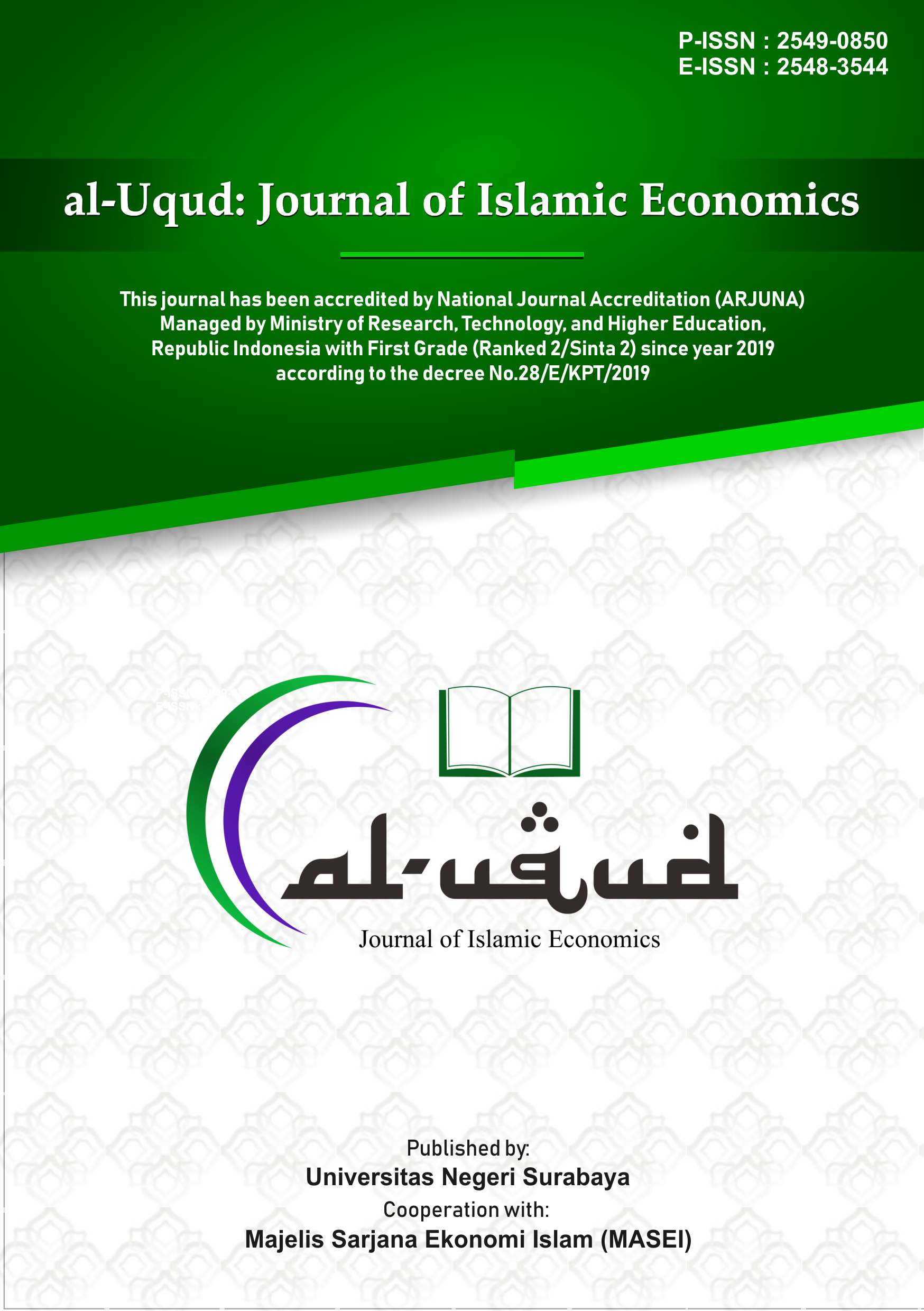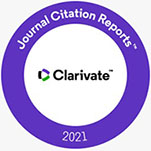Malay's perception of Islamic banking credibility
DOI:
https://doi.org/10.26740/aluqud.v6n2.p275-288Keywords:
Perception, Malay community, Credibility, Islamic bankAbstract
This study aims to analyze the perceptions and preferences of the Malay community towards Islamic banking and examine the opportunities and challenges of Islamic banking in maintaining its credibility. This research method is carried out with a quantitative descriptive approach through a survey of 100 respondents. The sampling technique used was accidental sampling through the distribution of google forms. The study results indicate that the development of the number of customers of Islamic banks has indeed increased. However, compared to conventional banks, it still dominates the number of customers who save in conventional banks even though the Malay community, which is predominantly Muslim, should be the dominant interest in Islamic banks. There are various perceptions of the Malay community towards Islamic banking. Some Malay people think that Islamic banks are stated in a profit-sharing manner the same as conventional banks, with the term interest only differing in mentioning term. Due to the lack of promotion, many Malay people still use conventional banks for economic transactions. Human resources management influences the perception of the Malay community towards Islamic banking.
References
Abdullahi, R., & Mansor, N. (2015). Fraud triangle theory and fraud diamond theory: understanding the convergent and divergent for future research. International Journal of Academic Research in Accounting, Finance, and Management Sciences, 5 (4): 38-45. https://doi.org/10.6007/IJARAFMS/v5-i4/1823
Abuddin, N. (1997). Filsafat Pendidikan Islam. Jakarta: Logos Wacana Ilmu.
Ainiyah, N. (2013). Pembentukan karakter melalui pendidikan agama Islam. Jurnal Al-Ulum, 13 (1): 25-38.
Albrecht, W., Steve, C.O. , Albrecht, C., & Zimbelman, M.F. (2012). Fraud Examination Fourth Edition. Mason, USA: South-Western, Cengage Learning.
Anderman, E.M., & Murdock, T.B. (2007). Psychology of Academic Cheating. London: Academic Press. https://doi.org/10.1016/B978-012372541-7/50002-4
Ariail, D., & Crumbley, D. (2016). Fraud triangle and ethical leadership perspectives on detecting and preventing academic research misconduct. Journal of Forensic & Investigative Accounting, 8(3), 480-500.
Baird Jr., J.S. (1980). Current trends in college cheating. Psychology in the Schools, 17 (4): 515-522. https://doi.org/10.1002/1520-6807(198010)17:4<515::AID PITS2310170417>3.0.CO;2-3
Bintoro, W., Purwanto, E. & Noviyani, D.I. (2013). Hubungan self regulated learning dengan kecurangan akademik mahasiswa. Educational Psychology Journal, 2(1): 57-64.
Burke, D. D., & Sanney, K. J. (2018). Applying the fraud triangle to higher education: Ethical implications. Journal of Legal Studies Education, 35(1), 5-43. https://doi.org/10.1111/jlse.12068
Djajadikerta, H., & Susan, M. (2020). The Determinants of students' intention to conduct fraud on assignments and examinations. Review of Integrative Business and Economics Research, 9, 119-124.
Draper, M.J., & Newton, P.M. (2017). A legal approach to tackling contract cheating?. International Journal for Educational Integrity, 13(1), 11. https://doi.org/10.1007/s40979-017-0022-5
Coughlan, S. (2015). Harvard students take pledge not to cheat, BBC News, 11 November 2015. https://www.bbc.com/news/business-34769435
Ghozali, I. (2011). Aplikasi Analisis Multivariate dengan Program IBM SPSS 19. Semarang: Badan Penerbit Universitas Diponegoro.
Hadisi, L. (2013). Pendidikan agama Islam: Solusi mengatasi perilaku menyimpang siswa SMK Negeri 1 Kendari. AL-IZZAH, 8 (2): 124-146.
Hadjar, I. (2017). The effect of religiosity and perception on academic cheating among Muslim students in Indonesia. Journal of Education and Human Development, 6(2), 139-147. https://doi.org/10.15640/jehd.v6n2a15
Hasbullah. (2001). Dasa-dasar Ilmu Pendidikan. Jakarta: Raja Grafindo Persada.
Herlyana, M. V., Sujana, E., & Prayudi, M.A. (2017). Pengaruh religiusitas dan spiritualitas terhadap kecurangan akademik mahasiswa: Studi empiris pada mahasiswa universitas pendidikan Ganesha Singaraja. e-Journal S1 Ak Universitas Pendidikan Ganesha, 8 (2). https://doi.org/10.23887/jimat.v8i2.13313
Indriani, I., Agus S., & Siti, M. (2016). Penerapan Konsep Fraud Diamond Teori dalam Mendeteksi Perilaku Fraud, Prosiding Simposium Nasional Akuntansi XIX, Lampung.
Istifadah, Rikyan Ulil & Senjani, Yayu Putri. (2020). Religiosity as the moderating effect of diamond fraud and personal ethics on fraud tendencies. Journal of Islamic Accounting and Finance Research. Vol. 2, 91-116. https://doi.org/10.21580/jiafr.2020.2.1.4712
Irvan, M. A. N. (2018). Pengaruh perilaku Islami dan lingkungan Islami terhadap kepatuhan sistem pengendalian internal dalam mencegah niat melakukan kecurangan: Studi empiris pada pondok modern darussalam gontor (Skripsi Sarjana Strata-1 Program Studi Akuntansi Fakultas Ekonomi Universitas Islam Indonesia).
Jamila. (2016). Pendidikan berbasis Islam yang memandirikan dan mendewasakan. Jurnal EduTech, 2(2), 73-83.
Jawapos.com. 2018. Terjadi kecurangan saat tes masuk STAN: Pelakunya anak pejabat. Juli 6. https://www.liputan6.com/news/read/3580866/terjadi-kecurangan-saat-tes-masuk-stan-pelakunya-anak-pejabat.
Karyono. (2013). Forensic Fraud. Yogyakarta: Penerbit Andi.
Kusaeri. (2016). Studi perilaku cheating siswa madrasah dan sekolah Islam ketika ujian nasional. Edukasia: Jurnal Penelitian Pendidikan Islam, 11(2), 331-354. https://doi.org/10.21043/edukasia.v11i2.1727
Kusuma, M. F. D. (2018). Faktor-faktor yang mempengaruhi mahasiswa melakukan tindakan kecurangan akademik dengan perspektif fraud diamond dan religiusitas: Studi pada mahasiswa akuntansi universitas Islam Indonesia (Skripsi Sarjana Strata-1 Program Studi Akuntansi Fakultas Ekonomi Universitas Islam Indonesia).
Lubis, M. A., & Sanjaya, B. (2022). The existence of integrated Islamic education in Malaysia. Innovation: Journal for Religious Innovation Studies, 22(1), 20-34. https://doi.org/10.30631/innovatio.v22i1.148
McHaney, R., Cronan, T. P., & Douglas, D. E. (2019). Academic integrity: Information systems education perspective. Journal of Information Systems Education, 27(3), 1.
Meitriana, M. A., Suwena, I. K. R., & Indrayani, L. (2019). The Influence of Fraud Triangle and Theory of Planned Behavior on Students Academic Fraud in Bali. In International Conference on Tourism, Economics, Accounting, Management, and Social Science (TEAMS 2018). Atlantis Press. https://doi.org/10.2991/teams-18.2019.24
Melati, I.N., Wilopo, R., & Hapsari, I. (2018). Analysis of the effect of fraud triangle dimensions, self efficacy, and religiosity on academic fraud in accounting students. The Indonesian Accounting Review, 8(2), 189-203. https://doi.org/10.14414/tiar.v8i2.1536
Muhsin, M., Kardoyo, M., Arief, S., Nurkhin, A., & Pramusinto, H. (2017). An Analysis of Student's Academic Fraud Behavior. In International Conference on Learning Innovation (ICLI 2017). Atlantis Press. https://doi.org/10.2991/icli-17.2018.7
Murdiansyah, I., Sudarma,M. & Nurkholis. (2017). Pengaruh dimensi fraud diamond terhadap perilaku kecurangan akademik: Studi empiris pada mahasiswa magister akuntansi universitas brawijaya. Jurnal Akuntansi Aktual ,4(2), 121-133. https://doi.org/10.25105/jat.v4i1.4965
Musrifah. (2016). Pendidikan karakter dalam perspektif Islam. Edukasia Islamika ,1(1), 119-133.
Mustapha, R., Isa, M., & Yunus, H. (2019). Spiritual intelligence and academic dishonesty: The Malaysian higher education student perspectives. European Journal of Education Studies, 6(2), 205-222.
Nurkhin, A., & Fachrurrozie. (2018). Analisis pengaruh dimensi fraud diamond terhadap perilaku kecurangan akademik mahasiswa pendidikan akuntansi UNNES. Liabilities Jurnal Pendidikan Akuntansi, 1(1): 1-12. https://doi.org/10.30596/liabilities.v1i1.2026
Padmayanti, K. D., Sujana,E. & Kurniawan, P.S. (2017). Analisis pengaruh dimensi fraud diamond terhadap perilaku kecurangan akademik mahasiswa. e-journalS1 Ak Universitas Pendidikan Ganesha, 8 (2): 1-12. https://doi.org/10.30596/liabilities.v1i1.2026
Prawira, I.D.M.S., & Irianto,G. (2015). Analisis pengaruh dimensi fraud diamond terhadap perilaku kecurangan akademik mahasiswa: Studi kasus pada mahasiswa S1 jurusan akuntansi perguruan tinggi negeri kota malang. Jurnal Ilmiah Mahasiswa FEB Universitas Brawijaya, 2 (2): 1-24.
Rafnhar, R., & Muslimin, M. 2022). The Effect of Academic Fraud Dimensions of Fraud Pentagon's On Accounting Students. JASa (Jurnal Akuntansi, Audit dan Sistem Informasi Akuntansi), 6(1), 122-134. https://doi.org/10.36555/jasa.v6i1.1713
Sabli, N., Hamid, N. A., Haron, N. H., & Wahab, R. A. (2018). Academic cheating among undergraduate accounting students: Fraud diamond theory perspective, 6. National Academy Of Managerial Staff Of Culture And Arts Herald, (1), 932-937.
Salamah, I. (2022). Factors Influencing Academic Dishonesty Among Sriwijaya State Polytechnic Students. International Journal of Science, Technology & Management, 3(2), 357-362. https://doi.org/10.46729/ijstm.v3i2.491
Saleh, S. (2017). Peran lembaga pendidikan dalam membentuk karakter bangsa." Prosiding Seminar Nasional Himpunan Sarjana Ilmu-ilmu Sosial, 2 (10): 101-112.
Santoso, M.H., & Adam, H. (2014). Analisis perilaku kecurangan akademik pada mahasiswa akuntansi dengan menggunakan konsep fraud triangle.Jurnal Ilmiah Mahasiswa FEB, 2 (2): 1-23.
Sekaran, U., & Bougie, R. (2017). Metode Penelitian untuk Bisnis (Edisi 6). Jakarta: Salemba Empat.
Setyaki, R. S., Pesudo, D. A. A., Andreas, H. H., & Chang, M. L. (2022). Does Personality Impact Academic Fraud?. Review of Integrative Business and Economics Research, 11(3), 81-98.
Singh, S., & Remenyi, D. (2016). Plagiarism and ghost writing: The rise in academic misconduct. South African Journal of Science, 112(5-6), 1-7. https://doi.org/10.17159/sajs.2016/20150300
Steel, A. (2017). Contract cheating: Will students pay for serious criminal consequences?. Alternative Law Journal, 42(2), 123-129. https://doi.org/10.1177/1037969X17710627
Ullah Khan, I., Khalid, A., Anwer Hasnain, S., Ullah, S., & Ali, N. (2019). The Impact of religiosity and spirituality on academic dishonesty of students in Pakistan. European Online Journal of Natural and Social Sciences, 8(3), 381.
Wardani, F. P. (2015). Pengaruh self efficacy, lingkungan belajar, dan disiplin belajar, terhadap perilaku kecurangan akademik siswa kelas XI IIS SMA Negeri 5 Yogyakarta Tahun Ajaran 2014/2015. (Skripsi program studi pendidikan akuntansi jurusan pendidikan akuntansi fakultas ekonomi universitas negeri Yogyakarta).
Widianingsih, L. P. (2013). Students cheating behaviors: The Influence of fraud triangle. Review of Integrative Business & Economics Research, 2 (2), 252-260.
Yendrawati, R., & Akbar, A. W. (2019). The influence of the fraud triangle and Islamic ethics on academic fraudulent behaviors. Review of Integrative Business and Economics Research, 8, 441-457.
Yudiana, A. P., & Lastanti, H.S. (2016). Analisis pengaruh dimensi fraud diamond terhadap perilaku kecurangan akademik mahasiswa fakultas ekonomi.Seminar Nasional dan Call Paper Fakultas Ekonomi UNIBA Surakarta -Invesment Challenges And Opportunities In Indonesian Capital Market In The Era Of Asean Economic Community- 412-422. https://doi.org/10.25105/jat.v4i1.4965
Zaini, M., Carolina, A., & Setiawan, A.R. (2015). Analisis Pengaruh Fraud Diamond dan Gone Theory Terhadap Academic Fraud: Studi Kasus Mahasiswa Akuntansi Se-Madura. Simposium Nasional Akuntansi 18 1-20.
Zamzam, I., Mahdi, S.A.R., & Ansar, R. (2017). Pengaruh diamond fraud dan tingkat religiuitas terhadap kecurangan akademik: Studi pada mahasiswa S-1 di lingkungan perguruan tinggi se kota Ternate. Jurnal Ilmiah Akuntansi Peradaban, 3(2): 1-24.
Zuhairini. (2004). Filsafat Pendidikan Islam. Jakarta: Bumi Aksara.
Downloads
Published
How to Cite
Issue
Section
License
Copyright (c) 2022 The author(s)

This work is licensed under a Creative Commons Attribution 4.0 International License.
CC BY 4.0 Abstract views: 285
,
Abstract views: 285
, PDF Downloads: 412
PDF Downloads: 412








